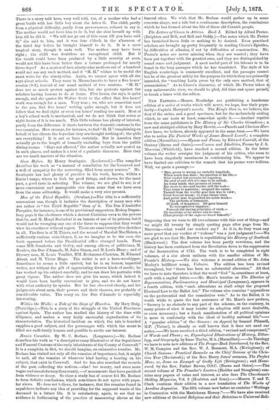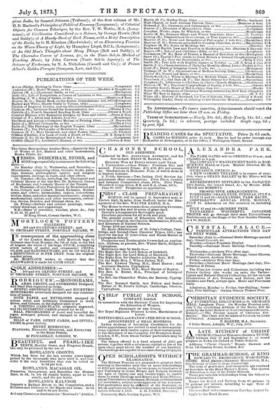NEW Enrrioxs.—Messrs. Routledge are publishing a handsome edition of a
series of works which will never, we hope, lose their popu- larity—Captain Marryatt's novels. The King's Own is, we believe, the first of the series, and a good specimen, but for the melancholy ending which, to our taste at least, somewhat spoils it.—Another reprint from the same publishers is The History of Sir Charles Grandison; a new and abridged edition by Mary Hewitt. —Pamela and Clarissa Mar- lowe have, we believe, already appeared in the same form.—We have also to notice The Poetical Works of James Russell Lowell; a complete edition (Macmillan).—Hymns and Poems, by Edward Caswall, of the Oratory (Barns and Oates).— Unseen and Idealities, Poems by J. S.. Maccrom (Whitfield), have reached a second edition. In the latter volume the writer arraigns the judgment of his critics, who seem to. have been singularly unanimous in condenaning him. We appear to have limited our criticism to the remark that his poems were tedious. Well, we quote a passage :—
Man, prone to wrong (so variedly beguiled), When much was done ; the question of his life,— IFhat conduct best promote.s his happiness, The good of each with all—was to be solved; An essay made, that promise of intent
But more to do—and harder still the task—
That essay to maintain ; resigned the cause;
Turned from the worthy goal that was in view;
Grew honour-weary; to some future time,
And purer zeal, bequeathed his noble work—
The problem of humanity,
Of truth, of happiness. He gave himself
To retrogressive impulses: Forsook the lasting principles of truth, — The knowledge of his nature and its laws: (That precept of the sage—to know himself)."
Supposing that we were to fill two columns with this sort of thing—ant! we might fill twenty by simply quoting page after page from Mr.. Maccrom—what would our readers say ? As it is, do they want any more proof that our verdict of "tedious" was a just judgment ?—We are glad to see that Mr. Burton is republishing his _History of Scotland. (Blackwood.) The first volume has been partly rewritten, and the history has been continued from the Revolution down to the suppression of the Insurrection of 1745. The work is to be completed in eight volumes, of a size about uniform with the smaller edition of Mr.. Fronde's History.—We also welcome a second edition of Mr. John Morley's brillliant essay, Voltaire. The edition has been revised throughout, but "there has been no substantial alteration." All that we have to note therefore is that the word" God" is, sometimes at least, spelt with a capital letter.—Mr. Hare's treatise on The Election of Representatives, Parliamentary and Municipal (Longmans), appears in a fourth edition, with "such alterations as shall adapt the proposed Electoral Law to the Ballot Act." The volume also contains "appendices on the preferential and the cumulative vote." As to the Ballot, it is worth while to quote the last sentences of Mr. Hare's new preface, Secrecy is no obstacle to any part of the scheme, on the contrary, in many points of view it may -render its adoption still more desirable, or even necessary ; but a frank manifestation of all political opinions is more in conformity with the ideal of healthy national life."
A "popular edition" of Our Seamen : an Appeal, by Samuel Plimsoll,. M.P. (Virtue), is already so well known that it does not need our notice.—We have received a third edition, "revised and compressed," of Words and Places; or, Etymological Illustrations of History, Ethno- logy, and Geography,byIsaac Taylor, MA. (Macmillan).—In Theology we have to note new editions of The Prayer-Book Interleaved, by the Rev. W. M. Campion and the Rev. W. J. Beamont, M.A. (Rivingtons); of Church Seasons: Practical Remarks on the Chief Seasons of the Chris- tian Year (Macintosh); of the Rev. Harry Jones' sermons, The Perfect Man; or, Jesus an Example of Godly Life (Rivingtons); and Home- ward, by the Rev. Father Rawes, O.S.C. (Burns and Oates).—The second volume of The Preacher's Lantern (Hodder and Stoughton) con- tains may papers of value and interest, as also does The Churchman's Shilling Magazine, Vol. 2 (Houlston and Sons).---Messrs. T. and T. Clark continue their edition in a new translation of The Works of Aurelius Augustine. The fifth volume now before us contains "Writings in Connection with the Manichtean Heresy."—We have also received new editions of Oriental Religions and their Relations to Universal Reli- pious India, by Samuel Johnson (Trilbner); of the first volume of Mr. H. D. Macleod's Principles of Political Economy (Longmans); of Celestial Objects for Common Telescopes, by the Rev. T. W. Wobbe, M.A. (Long- mans) ; of Civilisation Considered as a Science, by George Harris (Bell And Daldy); of A Handy-Book of Rock Names, with a Brief Description ,of the Rocks, by G. H. Kinahan (Hardwicke) ; of an Elementary Treatise -on the Wave-Theory of Light, by liumphry Lloyd, D.C.L. (Longmans) ; .of An Old Man's Thoughts about Many Things (Bell and Daldy); of The Clarendon Course of Lessons, 6.c., in the Tonic Sol-fa Method of Teaching Music, by John Curwen (Tonic Sol-fa Agency); of The Science of Exchanges, by N. A. Nicholson (Cassell and Co.) ; of Prince Albert's Golden Precepts (Sampson, Low, and Co.)



































 Previous page
Previous page